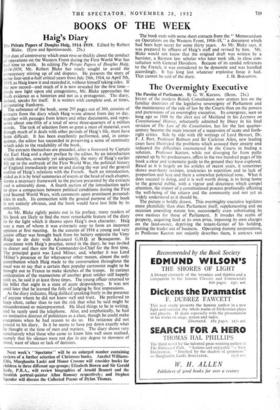BOOKS OF THE WEEK
Haig's Diary
THE dust of controversy which once rose so thickly about the conduct of operations on the Western Front during the First World War has had time to settle. In editing The Private Papers of Douglas Haig, 1914-1919, Mr. Robert Blake has wisely sought to avoid the unnecessary stirring up of old disputes. He presents the story of some four-and-a-half critical years from July 29th, 1914, to April 5th, 1919, as Haig knew it and recorded it, without himself taking sides. If the new record—and much of it is now revealed for the first time— sheds new light upon old antagonisms, Mr. Blake approaches the
• fresh evidence as a historian and not as a protagonist. The diary, indeed, speaks for itself. It is written with complete and, at times, devastating frankness. The substance of the book, some 295 pages out of 369, consists of extracts from the diary which Haig wrote almost from day to day, together with passages from letters and other documents, and repre- sents about one-fifth of a total of some three-quarters of a million words. The task of selection from so great a mass of material, even though much of it deals with other periods of Haig's life, must have been difficult. It has been excellently performed, and, in conse- quence, the editor has succeeded in preserving a sense of continuity which adds to the readability of the book. The extracts themselves are preceded, after a foreword by Captain the Earl Haig and a short preface by the editor, by an introduction which sketches, concisely yet adequately, the story of Haig's earlier life up to the outbreak of the First World War, the political history of England immediately prior to and during the war and the general outline of Haig's relations with the French. Such an introduction, aided as it is.by brief summaries of events at the head of each chapter, forms a necessary framework to the picture presented by the extracts and is admirably done. A fourth section of the introduction seeks to draw a comparison between political conditions during the First and Second World Wars, with comments upon prominent personal- ities in each. Its connection with the general purpose of the book is not entirely obvious, and the book would have lost little by its omission.
As Mr. Blake rightly points out in his preface, many readers of his kook are likely to find the most remarkable feature of the diary to be the light which it throws upon Haig's own character. Haig was a man of whom it was extremely easy to form an incorrect opinion at first meeting. In the autumn of 1916 a young and very junior officer was brought back from his battery opposite the Vimy Ridge to do duty with Advanced G.H.Q. at Beauquesne. In accordance with Haig's practice, noted ift the diary, he was invited to dinner and then saw the Commander-in-Chief for the first time. The principal guest was Lord Milner; and, whether it was Lord Milner's presence or for whatsoever other reason, almost the only contribution which Haig made to the conversation throughout the meal was to say that a certain then popular cartoonist ought to be brought out to France to make sketches of the troops. In curious anticipation of the mannerisms of another great soldier still happily with us, he said it at least three times. The young officer returned to his billet that night in a state of acute despondency. It was not until later that he learned the folly of judging by first impressions.
As the diary indicates, Haig disliked speaking freely in the presence of anyone whom he did not know well and trust. He preferred to keep silent, rather than to run the risk that what he said might be misunderstood or misrepresented. He liked things to be in writing, and he rarely used the telephone. Also, and emphatically, he had an instinctive distrust of politicians as a class, though he could make exceptions when he had reason to do so. His reticence did not extend to his diary. In it he seems to have put down exactly what he thought at the time of men and matters. The diary shows very conclusively what those who came to know him well soon realised, namely that his silences were not due in any degree to slowness of mind, want of ideas or lack of decision.
The'book ends with some short extracts from the " Memorandum on Operations on the Western Front, 1916-18," a document which had been kept secret for some thirty years. As Mr. Blake says, it was prepared by officers of Haig's staff and revised by him. Mr. Blake would not know that the original draft was written by a barrister, a Barstow law scholar who later took silk, in close con- sultation with General Davidson. Because of its candid references to the French, it was considered to be dynamite and was handled accordingly. It has long lost whatever explosive force it had.


































 Previous page
Previous page